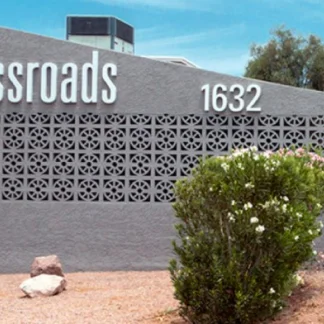Jewish Family Service
Jewish Family & Children's Services (JFCS) is a substance abuse and mental h...
Crossroads - Flower Campus is an alcohol and drug rehab program in Phoenix, Arizona that offers addiction treatment to men seeking recovery. Their programs are for those who need the structure of living on-site while undergoing treatment.
Crossroads – Flower Campus specializes in helping men work through the challenges associated with men’s recovery needs. Their programs include:
Residential Treatment The residential program focuses on providing a safe environment where men can stabilize and do deep healing work. This program offers furnished rooms that sleep two to three people. Clients engage in 12-Step meetings, self-help groups, and peer support.
Private Insurance Crossroads – Flower Campus accepts most insurance plans, including Wellmark, TRICARE, HCSC, Beacon, Anthem, Blue Cross Blue Shield, Magellan, and United Healthcare. Out of network benefits may vary, so it’s important to verify coverage prior to starting treatment.
Contact us for more information: (602) 263-5242

Connect with Crossroads - Flower Campus for Men by calling their admissions team directly.
(602) 263-5242 Website Get DirectionsState Licenses are permits issued by government agencies that allow rehab organizations to conduct business legally within a certain geographical area. Typically, the kind of program a rehab facility offers, along with its physical location, determines which licenses are required to operate legally.
State License: Arizona
Cognitive Behavioral Therapy (CBT) is a therapy modality that focuses on the relationship between one's thoughts, feelings, and behaviors. It is used to establish and allow for healthy responses to thoughts and feelings (instead of unhealthy responses, like using drugs or alcohol). CBT has been proven effective for recovering addicts of all kinds, and is used to strengthen a patient's own self-awareness and ability to self-regulate. CBT allows individuals to monitor their own emotional state, become more adept at communicating with others, and manage stress without needing to engage in substance abuse.
Group therapy is any therapeutic work that happens in a group (not one-on-one). There are a number of different group therapy modalities, including support groups, experiential therapy, psycho-education, and more. Group therapy involves treatment as well as processing interaction between group members.
In individual therapy, a patient meets one-on-one with a trained psychologist or counselor. Therapy is a pivotal part of effective substance abuse treatment, as it often covers root causes of addiction, including challenges faced by the patient in their social, family, and work/school life.
Group therapy is any therapeutic work that happens in a group (not one-on-one). There are a number of different group therapy modalities, including support groups, experiential therapy, psycho-education, and more. Group therapy involves treatment as well as processing interaction between group members.
In individual therapy, a patient meets one-on-one with a trained psychologist or counselor. Therapy is a pivotal part of effective substance abuse treatment, as it often covers root causes of addiction, including challenges faced by the patient in their social, family, and work/school life.
In individual therapy, a patient meets one-on-one with a trained psychologist or counselor. Therapy is a pivotal part of effective substance abuse treatment, as it often covers root causes of addiction, including challenges faced by the patient in their social, family, and work/school life.
Jewish Family & Children's Services (JFCS) is a substance abuse and mental h...
Enchantment Workshops, located in Phoenix, Arizona, provides alcohol and drug re...
Southwest Behavioral Health - Erickson Outpatient is a behavioral health care an...
Phoenix Shanti Group is a private rehab located in Phoenix, Arizona. Phoenix Sha...